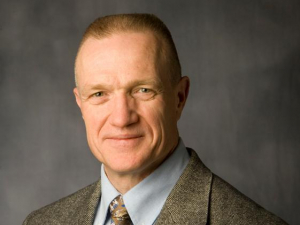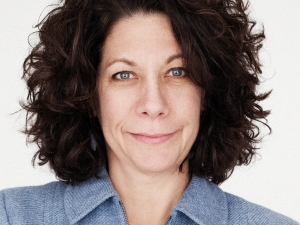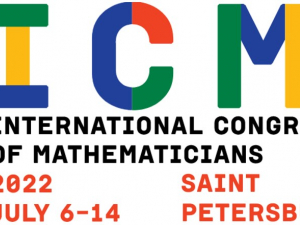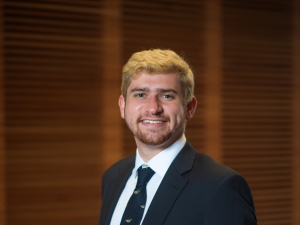Robert Bryant, Phillip Griffiths Professor of Mathematics and Mathematics Department Chair, has been named a Fellow of the American Association for the Advancement of Science. He was recognized for “Distinguished contributions to differential geometry and their applications to physics, and for extraordinary service to the mathematics profession.” “Becoming a AAAS Fellow is among the most distinct honors within the scientific community, and the AAAS Council elects its Fellows deliberately and carefully to preserve the… read more about Robert Bryant Named AAAS Fellow »
As part of Duke Research Week 2022 (Jan. 31-Feb. 4), the Duke Office for Research & Innovation will host the 2nd Annual Daubechies Lecture in honor of James B. Duke Distinguished Professor of Mathematics and Electrical and Computer Engineering Ingrid Daubechies. This year's lecture – "Quorum Sensing Across Domains: From Viruses to Bacteria to Eukaryotes" – features keynote speaker Bonnie L. Bassler, Howard Hughes Medical Institute Investigator and Squibb Professor and Chair of Molecular Biology at Princeton… read more about Daubechies Lecture 2022 - Quorum Sensing Across Domains: From Viruses to Bacteria to Eukaryotes »
Duke University had a very exciting year in science in 2021. Here is a roundup of some of the science stories covered this year. Robo Dragonfly: DraBot uses air pressure, microarchitectures and self-healing hydrogels to watch for changes in pH, temperature and oil Identifying New Drug Targets for COVID-19: The coronavirus’s tangled strands of RNA could offer new ways to treat people who get infected Ghost Forests: Rising seas and inland-surging seawater are leaving behind the… read more about The Year in Science at Duke »
Two Duke University seniors are among the 41 recipients of the prestigious Marshall Scholarship, the program announced Monday. Yasa Baig of Foxborough, Massachusetts, and James Marek of Yardley, Pennsylvania, have been chosen from applicants throughout the country. Approximately 40 Marshall Scholarships are awarded each year to high-achieving American students to pursue post-graduate studies at any university in the UK in any field. The award covers all university fees, cost-of-living expenses and many other costs… read more about Two Duke Seniors Join 2022 Marshall Scholars for Graduate Study in the United Kingdom »
On the third floor of Gross Hall lies a whimsical island where the landscape and creatures are not what they seem. The 20-foot-long, 10-foot-wide piece, a mixed-media art installation dubbed “Mathemalchemy,” is the result of a two-year collaboration between Duke mathematician Ingrid Daubechies, Canadian fiber artist Dominique Ehrmann and more than 20 others; devoted to the beauty, fun and creativity of math. On one side of the installation, fanciful sea creatures frolic in an ocean… read more about Art Installation Celebrates the Beauty and Whimsy of Math »
DURHAM, N.C. -- As North Carolina lawmakers debated new district maps for the state legislature and the United States House of Representatives, two Duke experts spoke to journalists about what the newly drawn maps could mean for North Carolina voters and future elections for the next decade: Watch the briefing on YouTube. Here are excerpts: On how these maps compare to the ones previously discarded as unconstitutional ASHER HILDEBRAND, associate professor of the practice, public policy… read more about Experts Discuss Redistricting in North Carolina »
Duke Math 212 students discuss an exciting class project using linear algebra to help restore early Renaissance paintings. read more about Math 212 students use math to restore Renaissance painting »
Forty-five mathematical scientists from around the world have been named Fellows of the American Mathematical Society (AMS) for 2022, the program's tenth year. AMS members designated as Fellows of the AMS have made outstanding contributions to the creation, exposition, advancement, communication, and utilization of mathematics. The AMS is pleased to honor excellence by presenting the class of 2022 Fellows, who are being recognized by their peers for their contributions to the profession. View the names, institutions, and… read more about AMS names Samit Dasgupta in 2022 Class of Fellows »
As early as next week, North Carolina lawmakers will begin to craft maps, grouping voters into districts that will elect the next officials to serve in the state legislature and the United States House of Representatives. These maps “will not only shape our political landscape, but also the contours of our democracy for the next decade,” said Deondra Rose, associate professor in the Sanford School of Public Policy and director of Polis: Center for Politics. North Carolina is rapidly growing and changing. The 2020 census… read more about Five Things to Know About Redistricting in North Carolina »
The International Congress of Mathematicians (ICM) is the largest conference for the topic of mathematics. It meets once every four years, hosted by the International Mathematical Union (IMU). The Fields Medals, the Nevanlinna Prize, the Gauss Prize, and the Chern Medal are awarded during the congress's opening ceremony. Each congress is memorialized by a printed set of Proceedings recording academic papers based on invited talks… read more about Duke Math professors to speak at ICM »
Scholars, practitioners and advocates will examine the legal and political landscape of redistricting, preview the ongoing process in North Carolina and around the country, and discuss reforms during a conference Sept. 28-29 at Duke. “Redistricting and American Democracy” will also give Duke students and the general public an opportunity to learn how redistricting will impact them -- and what they can do about it. Attendance at in-person events is limited to individuals with a Duke ID plus invited guests. All… read more about The Past, Present and Future of Redistricting in North Carolina and Beyond »
In March of 2020, thousands of Duke staff and faculty began working remotely due to the COVID-19 pandemic. A pre-pandemic calendar still hangs in the office of Alumni Engagement & Development. Photo courtesy Mark Wienants. In the roughly 18 months since, many members of the Duke workforce have gradually returned to work on-site, cleaning off desks filled with old calendars and notes, and catching up with colleagues they may not have seen in more than a year. We asked… read more about Reflections on Returning to Work on Campus »
Duke Math's Ingrid Daubechies is lauded in the NY Times article, "The Godmother of the Digital Image." Check out this article that chronicles Ingrid's work and life - it begins with: In the summer of 2010, while preparing for a long research trip to Madagascar, the mathematician Ingrid Daubechies bought a 50-inch flat-screen TV for her husband, so he could invite friends over to watch Premier League soccer games. After setting it up, the couple turned on a match, and while Daubechies’ husband, the mathematician and… read more about The Godmother of the Digital Image »
Duke Math graduate student Stephen McKean was awarded a Bass Instructional Fellowship this year, for which he designed the course "The Art of Proof." The Bass Instructional Fellowship provides funded, semester-long teaching opportunities for PhD students. Applicants design a prospective course, and Bass Instructional Fellowships are awarded competitively based on the pedagogical preparation of the applicant, as well as the likelihood of strong undergraduate interest in the proposed course. The Art of Proof is a… read more about Stephen McKean teaches "The Art of Proof" - Bass Instructional Fellowship »
Graduate student Jack McErlean has been accepted into the National Science Foundation's (NSF) Graduate Research Fellowship Program (GRFP). The program is the country’s oldest fellowship program that directly supports graduate students in various STEM fields. The GRFP provides three years of support for the graduate education of individuals who have demonstrated their potential for significant research achievements in STEM or STEM education. Jack is an incoming graduate student, and is broadly… read more about Jack McErlean awarded NSF Graduate Research Fellowship »






























